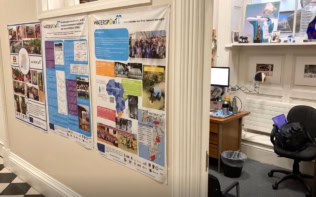
A physicist in the UK has set up a new website for sharing preprints following criticisms about the way that the popular arXiv.org preprint server is moderated. Called viXra.org, which is the reverse of arXiv, the rival server — unlike arXiv — places no restrictions on the sorts of papers that can be posted. “This is an experiment to find out what kind of stuff is not managing to get into the arXiv, as well as being a serious archive for people to put their research in,” says Philip Gibbs, an independent physicist based in the UK and creator of viXra.
Gibbs decided to set up viXra having listened to claims on blogs and the tell-all website archivefreedom.org that arXiv administrators, who are based at Cornell University in the US, unfairly reject certain manuscripts or transfer them to the server’s less reputable “general-physics” category. He claims that arXiv‘s moderation policy could mean that the site misses out on papers containing fundamental breakthroughs. “The arXiv is really trying to filter out the stuff that is not following the same line of argument that’s being followed already, [and] really you need to give people the freedom to try the approaches that they think will work,” he says.
Two-stage filtering
Cornell’s arXiv has its roots in xxx.lanl.gov, a server set up in 1991 by Paul Ginsparg, then at the Los Alamos National Laboratory, to share preprints in high-energy physics. The idea caught on fast, and by 2001, when Ginsparg moved to Cornell, the renamed server was stashing thousands of preprints in different areas of physics and maths every month. Now arXiv has over half a million preprints and is the first port of call for many physicists wanting to track the latest papers without having to wait for them to appear in conventional, peer-reviewed journals.
Librarians at Cornell use a two-stage filtering process to ensure that all the uploaded preprints are of at least “refereeable” quality. First, authors must gain the approval of a recognized endorser, who is typically someone with a prestigious academic affiliation or who has a proven track record of submissions. Second, the endorsed preprints pass under the eyes of a moderator to check that they are not nonsense and that they qualify for one of the 18 main subject categories. Of some 250 new submissions received every day, a Cornell librarian says just “a few” are rejected.
‘Blacklisting’ claims
One researcher who objects to this system is Marni Sheppeard, a theorist at Oxford University in the UK. She believes that her attempt six years ago to submit a highly speculative preprint left her “blacklisted”, which more recently barred her from uploading a serious paper, despite having a suitable endorser. Others, meanwhile, think the moderation is open to academic bias, particularly since — in the case of physics papers — it is performed by a fixed group of unnamed individuals.
For example, Columbia University mathematician Peter Woit claims there is a “pro-string-theory” bias among moderators because “trackbacks” to his entries on his blog Not Even Wrong that criticize preprints on string theory and multiverses are removed. (Trackbacks are designed to alert an author when their preprint is referenced online.) “On the trackback issue, I’ve seen a disturbing ideological bias and lack of transparency at the arXiv,” he says. At the same time, I’m quite sympathetic to the difficulties they face evaluating preprints in fields where research is often very speculative.”
Targeting the community
But Ginsparg, who now sits on arXiv‘s advisory board, denies the existence of any blacklist or system for automatically rejecting papers written by certain authors. He told Physics World that Cornell’s filtering system is only biased in the sense that it seeks “to accommodate the interests of people within the research community” and not “outsiders”. Indeed, he points out that many professional researchers think that there is already too much “garbage” on the site, while the “outsiders” think there is too little.
Tommaso Dorigo, a particle physicist at the University of Padova in Italy who has written on his blog about possible arXiv blacklisting, thinks that the Cornell moderators should always err on the side of inclusion. “The recipe is easy: if you don’t have a clear hunch, you should let it through,” he says.
But for now it looks like arXiv will not have to worry too much: as today there were just seven papers on the viXra site.



